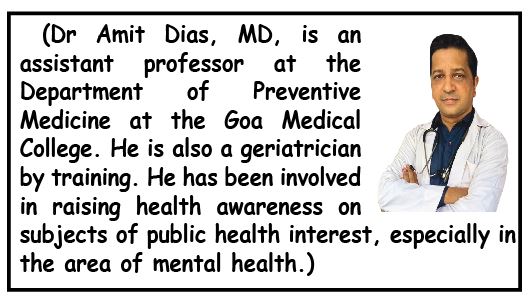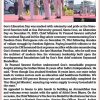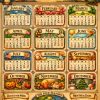Goa is abuzz with excitement as vintage bike and car owners, users, collectors and fans are decking […]
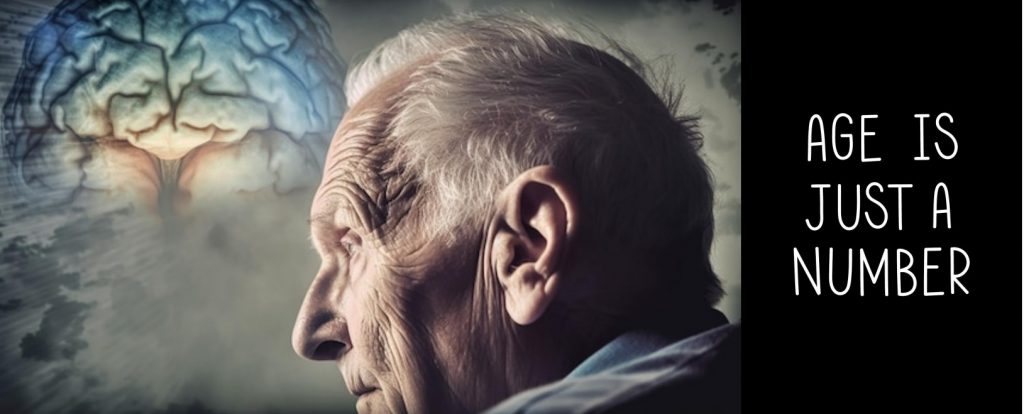
REVEALING THE SECRETS OF HEALTHY AGING!
Aug 31- Sep 06 2024, MIND & BODY, HEART & SOUL August 30, 2024A World Senior Citizens Day Special!
Q/A interview with Dr Amit Dias
The UN observes August 21 as World Senior Citizen’s Day and we took this opportunity to speak to Dr Amit Dias, to understand the secrets of healthy aging. He says, “The secret to healthy aging and cognitive wellbeing lies in the word ‘SENIORS’ itself.” Here are the secrets to healthy aging in a Q&A interview…
Goan Observer: Thank you for joining us on the occasion of World Senior Citizens’ Day, What is the significance of observing this day?
Dr Amit Dias: Observing World Senior Citizens’ Day is crucial because it brings attention to the contributions of our elderly population and the challenges they face. It’s a day to remind us all that growing old is a privilege, not a burden. As we honor our seniors, we recognize the wisdom, love, and life experiences they bring into our lives. This day is about acknowledging that the elderly are not just old in years, but rich in wisdom and stories that shape our future.
One needs to strive to be independent and this is the focus of our new initiative called the Integrated Care of Older People (ICOPE). It was also central in developing the intervention for the prevention of depression in the elderly (the DIL initiative). People need to be motivated to take their health into their own hands and not wait for someone else to do it for them. People will be able to help you sometimes but not every time and that’s when your health will slip back.
Q: Any significant reason for this particular day?
A: The day was officially announced by former US president, Ronald Reagan in 1988 after signing a proclamation that declared August 21 as National Senior Citizens Day, in the US. Later other countries also adopted this and began to observe the day and finally in 1990 the United Nations General Assembly declared August 21 as World Senior Citizens Day. With the demographic transition that we are going through, it’s even more imperative to observe this day and highlight the concerns for the elderly.
Q: What is the demographic transition that you are referring to?
A: The world is undergoing a significant demographic transition. Globally, the population is aging at an unprecedented rate. According to the World Health Organization (WHO) by 2050, the number of people aged 60 years and older will double, reaching around 2.1 billion. In India, the elderly population is projected to reach nearly 320 million by 2050. This shift presents both opportunities and challenges.
On one hand, we have a wealth of experience and wisdom among our senior citizens; on the other, there are rising concerns related to healthcare, social security, and age-related diseases. The increasing elderly population demands that we rethink our health systems, social services and policies to better support this growing segment of society.
Q: That’s indeed significant. What message would you like to give our readers on this occasion?
A: My message to readers is to embrace the aging process with positivity and to recognize the importance of healthy aging. Aging is inevitable, but how we age can be influenced by our lifestyle choices. It’s essential to adopt habits that contribute to our physical, mental and social well-being. Senior citizens should not just add years to life but add life to years, making the most of their golden years.
The secret to health and cognitive wellbeing in seniors lies in the word ‘SENIORS’ itself —Stay Active, Eat well, Nourish social connections, Invest in lifelong learning, Organize your environment, Rest well and Seek help.
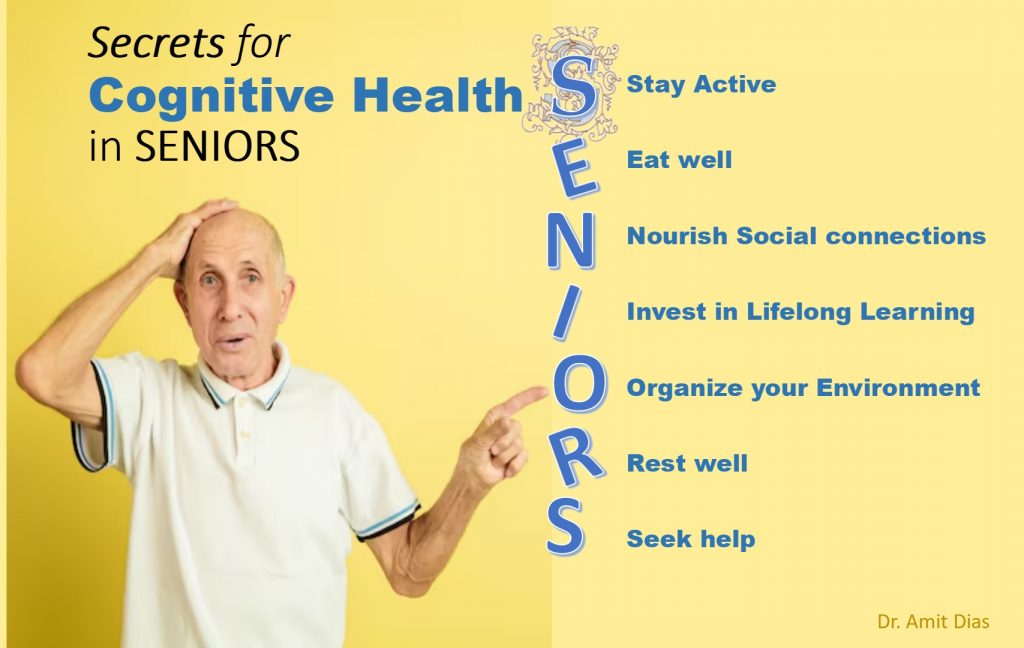
Q: That’s very interesting, especially as we enter the World Alzheimer’s Awareness Month. Could you expand on each of these points and explain how they contribute to health?
A: Let’s break it down for you:
Stay Active: Physical activity is one of the most important factors in healthy aging. Regular exercise, such as walking, yoga, or swimming, helps maintain muscle mass, improves cardiovascular health, and enhances mobility. Exercise also has a positive impact on brain health, reducing the risk of cognitive decline and improving memory through the release of brain-derived neurotrophic factor (BDNF) which supports brain function.
Eat Well: A balanced diet rich in fruits, vegetables, whole grains, and lean proteins is essential for maintaining physical and mental health. Proper nutrition provides the body with the necessary nutrients to function optimally, supports immune function, and helps prevent chronic diseases like diabetes and heart disease. Omega-3 fatty acids, for example, are known to support brain health and reduce the risk of memory loss.
Nourish Social Connections: Social interaction is crucial for mental and emotional well-being. Engaging with family, friends and community groups can reduce feelings of loneliness and depression, which are common in older adults. Social connections also stimulate cognitive functions, keeping the mind active and potentially delaying the onset of dementia.
Invest in Lifelong Learning: Continuous learning keeps the brain engaged and sharp. Whether it’s picking up a new hobby, learning a new language, or staying informed about current events, lifelong learning stimulates neural connections. It improves cognitive reserve, which can protect against memory decline.
Organize Your Environment: A well-organized living space reduces stress and increases safety, particularly for seniors. It’s important to de-clutter and create a space that’s easy to navigate, which can prevent falls and improve overall wellbeing. A structured environment also aids in better memory retention, as it reduces distractions and helps the brain focus.
Rest Well: Quality sleep is vital for physical and mental health. During sleep, the body repairs itself, and the brain processes and consolidates memories. Poor sleep is linked to cognitive decline, so seniors must maintain a regular sleep schedule and create a restful sleep environment.
Seek Help: It’s important to recognize when to seek help, whether for health issues, emotional support, or daily tasks. Be compliant with your medications. Early intervention in health matters can prevent minor issues from becoming major problems. Additionally, having a support system reduces stress and anxiety, contributing to better mental health and overall quality of life.
By focusing on these aspects, seniors can lead healthier, more fulfilling lives, with improved memory and cognitive function, ultimately adding life to their years. We provide such opportunities for cognitive stimulation at the Memory Cafe started for seniors in the state of Goa. It’s run by seniors, for seniors, and it’s probably the best investment of my time and energy. I would encourage all seniors to join.
Q: That’s a comprehensive and great initiative. How can we as a society help add life to years for our senior citizens?
A: As a society, we can play a significant role by fostering an environment that respects and supports our elderly. This includes providing accessible healthcare, promoting social inclusion, offering opportunities for continuous learning, and ensuring that seniors have access to safe and comfortable living conditions. Additionally, encouraging intergenerational interactions can bridge the gap between young and old, fostering mutual respect and understanding.
By prioritizing the wellbeing of our seniors, we not only enhance their quality of life but also strengthen the fabric of our communities. As we enter September — observed as the World Alzheimer’s Awareness Month, and talk about dementia-friendly communities, we need to speak about building elder-friendly communities — we form the community.
